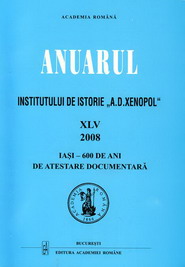Historie als Literatur – Literatur als Historie: schreiben über Auschwitz
Historie as Literature – Literature as History: about Auschwitz
Author(s): Cristina SpineiSubject(s): History
Published by: Editura Academiei Române
Keywords: Holocaust; guilt; collective memory; commemoration; literature
Summary/Abstract: As generations of survivors disappear one after another, and the history of the Third Reich hardly appears in the biography of the only survivors today, the experts (authors) find themselves in need to look at the Holocaust literature in relation to the background history from which it was derived. Germany’s authoritarian past is presented as one of the main themes in post-war German literature. In many texts there is the question of the guilt of the criminals of the Nazi regime and the possibility to process this historical burden and try to create memoirs or works with a commemorative character. The fact that there are so many writings about the Holocaust, that these books will be read by large audience at home and abroad, demonstrates the topicality of the theme and the lasting influence exerted by Germany’s national-socialist past on today’s generation. The texts that are now included under the phrase “Holocaust Literature” confronts the reader with a frightening reality and unimaginable inhumanity. There is much written about national-socialism and its perpetrators, especially about the Holocaust and, equally, on anti-Semitism and its long history. A literature through which all those people who lost siblings, parents and children in Auschwitz reconnect with the horrors committed in this camp. A literature that should express less aesthetics and more obvious ethics in relation to the horrors of what happened, because this is the only way to cause a precise reproduction of the immeasurable pain for those who were direct participants. The question the study aims to answer is simple: “To what extent can one write about this phenomenon and to what extent can one not write?". Holocaust literature can not be considered an aesthetic phenomenon. It is perhaps the best example of the indissoluble relation between literature and history. Based on the finding that the research on the Holocaust novel requires an interdisciplinary approach, the study proposes an overview of the different means of expression used in the literature on the Holocaust: in other words, what are the means the authors used to formulate their ideas about the Shoah. What can literature offer to historical exposure? Why literature can not be separated from history? To what extent is history important for literature? These are all questions the study seeks to answer.
Journal: Anuarul Institutului de Istorie »A.D. Xenopol« - Iaşi
- Issue Year: XLV/2008
- Issue No: 45
- Page Range: 287-305
- Page Count: 1
- Language: German

